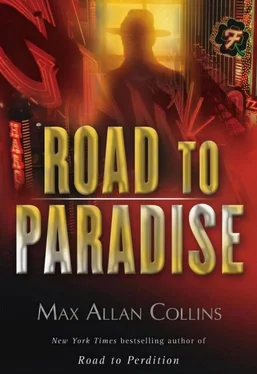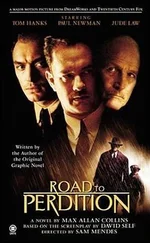Of course he had the right: he was her father. When Michael O’Sullivan, Sr., had gone for the final showdown with Connor Looney, Michael O‘Sullivan, Jr., had been left behind in a residential hotel not unlike this one, in Prophet’s Town, Illinois... What had it been called? Could it have been... the Paradise Hotel?
And Papa had left him a letter, like the one he had ready to leave Anna, and... how had he felt about it? Frightened, alone, and a little betrayed. He’d promised his father he would not open that envelope, and he had stared at it long and hard, wondering what was inside, terrified of what was written in there, and that his father would never return .
What an awful, endless night that had been...
“All right,” he said. “You can drive.”
“All right !” she said, and swung a tiny fist. “And I’ll have my gun along? I’ll be armed and dangerous, won’t I?”
“Bet your life,” he said.
But he left his eighteen-year-old getaway girl in the Caddy, parked on Lexington, and walked a block before turning right and walking another three to Wenonah Avenue, where he turned right again. Two blocks later he could see the house on the corner of Wenonah and Fillmore, a distinctive red-tile-roofed yellow-brick bungalow, one-and-a-half stories with arched windows — solid, spacious, unassuming, perfect digs for the gangster who wants comfort without calling undue attention to himself.
Earlier, from a phone booth at the Interstate 80 truck stop, Michael had called the number Accardo gave him, and Accardo himself called back in two minutes — better service than the WITSEC panic button.
“Edgar’s kids’ve been watching the place,” Accardo’s rough baritone had informed him, meaning the FBI had an ongoing surveillance of Giancana’s residence. “Kind of trading off with the neighborhood kids.”
Indicating the Chicago PD’s organized crime unit was also keeping an eye on the house. Though using a supposedly “secure” line, the ganglord was speaking somewhat elliptically, so Michael followed suit.
“Hmmm,” Michael said. “Well, I might make some noise.”
“When you thinking?”
“Tonight.”
“Any special time?”
“Around Johnny Carson.”
“...Okay. You been to the guy’s house before?”
Meaning Giancana.
“Couple times,” Michael said. “Wasn’t exactly on a recon, though.”
“A garage back there, on the alley. You’ll see some garbage cans. People throw the damnedest things away these days. Perfectly good items.”
“Yeah, it’s a real waste.”
“Backyard’s fenced in — I hear there’s been trouble with the lock on the gate in the fence, lately.”
“Too bad. Risky with all the vandalism.”
“Sure is. Garden back there, head of the house likes to putter, but never at night. Sometimes he forgets and leaves the house open in back.”
“Isn’t that the door we spoke about?”
The steel door with the Joe-sent-me peephole. Joe Batters, in this case.
“Yeah,” Accardo said. “That door.”
“Okay. Will he have any friends over?”
Bodyguards or security staff?
“No. I have on good authority, a couple guys who usually keep him company won’t be around. They work hard. Deserve a night off.”
“What about his housekeeper and his wife?”
That was the DiPersios, Giancana’s longtime seventy-something caretaker and his housekeeper wife, who were live-in.
“Their apartment’s upstairs, on the second floor. They go to bed early.”
“Probably early risers, too, then,” Michael said. “Do they set the alarm, d’you suppose?”
Giancana was known to have an electric-eye burglar alarm.
“Not tonight,” Accardo said darkly. “...Anything else I can help you with, son?”
“No, sir. Thank you.”
But now as Michael strolled down the tree-lined street toward the alley beside the bungalow, he noted with surprise no suspicious cars. Several vehicles were parked along nearby curbs, but not the unimaginative standard-issue black sedans both the feds and Chicago PD were noted for — in fact, right across from 1147 South Wenonah were a red Mustang convertible and a white Pontiac Trans Am with a blue racing stripe.
No surveillance here, not at this moment — of course, the feds and cops liked to eat, and everybody had to piss now and then.
In the alley he found the garbage cans, three of them, nestled next to the yellow-brick garage. The first lid he lifted revealed a .22 target pistol perched cherry-on-the-sundae atop a fat filled garbage bag.
With a black-leather-gloved hand, Michael lifted the target pistol out — a High Standard Duromatic whose four-inch barrel had been tooled down to receive a six-inch homemade noise suppressor, a threaded tube drilled diagonally with countless holes. Fairly standard Outfit whack weapon, these days — a .22, not unlike the ones the two DeStefano hitters brought to the Cal-Neva, before Michael killed them. He checked the clip — full. The ammo looked fine.
If Accardo’s people had left him a sabotaged gun, he still had his .45 in a shoulder holster. But with the chance of cops or feds returning, within easy hearing range of gunfire, this silenced .22 would do the trick nicely. He stuck the somewhat bulky weapon in the waistband of his slacks, leaving his sport coat unbuttoned.
As promised, the gate in the stockade-type fence was unlocked. Michael opened and closed it with little sound, entering a backyard with no security lights, though the moon gave an ivory glow to this immaculately tended little world of putting green, clipped hedges, and colorful flower beds. A circular stone patio hugged the house, but Michael’s crepe soles made no sound as he crossed to descend the cement steps to the steel door, which stood slightly ajar. A pleasant, spicy cooking odor wafted out.
That was not surprising. Michael had been at the Giancana home several times, and had been in the elaborately “finished” basement, with the spacious paneled den where the little gangster loved to spend his private time, and sometimes hold court. What lay beyond the steel door was a fully equipped modern kitchen.
One hand on the butt of the .22 target pistol in his belt, Michael pushed the door open — it creaked just a little, but the voice of Frank Sinatra covered for him: “Softly, As I Leave You” was playing, not loud, just background music, a nearby radio or distant hi-fi. Michael recognized the album — it was one of the four-tracks he’d tossed in Walker Lake.
He stepped inside to air-conditioned coolness, shutting the door behind him, as the pleasant cooking smell tweaked his nostrils. The counters and appliances were white, the paneling and cupboards a blond oak, the overhead lighting fluorescent. At the stove a swarthy, skinny little man — bald but for a friar’s fringe of gray — in a blue-and-white-checked untucked sport shirt, baggy brown slacks, and slippers with socks was tending two pans, frying sausage in olive oil in one and boiling up spinach and ceci beans in the other.
Both Mama and Papa Satariano had been magicians in the kitchen, so Michael knew exactly what the basement chef was up to — the sausage would be removed, and the spinach (or was that escarole?) and beans would eventually be transferred to the other pan to sauté in the sausage grease, with pinches of garlic no doubt, while the sausage would be added back in, for a killer of an Old Country snack.
The man at the frying pan sensed the presence of another, and before turning, said, “Butch — is that you? Forget something?”
“No,” Michael said, and withdrew the .22.
Sam Giancana — deep melancholy grooves in his stubble-bearded face, his nose a lumpy knob, his eyes at sad slants, an effect echoed by white bushy eyebrows — looked at the gun first. Then up at Michael.
Читать дальше











